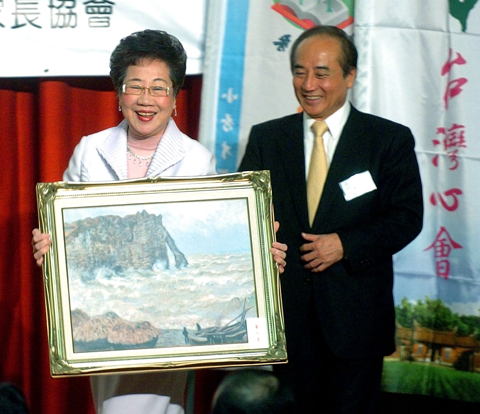Chinese Nationalist Party (KMT) lawmakers have proposed an amendment to the Act Governing Relations between the Peoples of the Taiwan Area and the Mainland Area (兩岸人民關係條例) that would allow mayors and county commissioners to visit China without seeking permission.
The proposal, initiated by KMT legislators Chu Fong-chi (朱鳳芝), Chang Ching-chung (張慶忠) and others, would also lift cross-strait travel restrictions on high-ranking public servants and police officers.
The Act requires senior public servants, senior police officers and officials of various agencies related to national security to apply with the Ministry of the Interior (MOI) for approval to travel to China.

PHOTO: GEORGE TSORNG, TAIPEI TIMES
It also requires mayors and commissioners to obtain approval from a committee of officials from the MOI, the Ministry of Justice (MOJ), the Mainland Affairs Council (MAC) and the National Security Bureau (NSB) before visiting China.
Chu said the restrictions make trips to China inconvenient and ineffective for mayors and county commissioners.
Mayors and county commissioners could promote Taiwan’s agricultural products, tourism, business and culture in China, she said, adding that their posts did not concern issues of national security.
The proposal says that only officials from the Ministry of National Defense, the NSB, the MOJ’s Investigation Bureau and public servants working with national security issues should be restricted from visiting China.
The legislature’s Internal Administration Committee is scheduled to review the amendment on Wednesday.
The Democratic Progressive Party (DPP) caucus said it opposed the amendment.
Senior officials could leak information on national security if they make frequent visits to China without restrictions, DPP caucus whip Lee Chun-yee (李俊毅) said.
Lee said that in a number of cases, government officials from various agencies had been charged with spying for China.
“The proposed amendment would hurt Taiwan’s national interests and put the county in danger,” Lee said. “Such an amendment is irresponsible because it was proposed without a thorough review of its potential impact on national security.”
In related news, former vice president Annette Lu (呂秀蓮) and Legislative Speaker Wang Jin-pyng (王金平) yesterday disagreed on communication between the KMT and the Chinese Communist Party (CCP).
While Lu said she was in favor of abolishing the party-to-party platform, Wang said it remained essential.
The two made the remarks at a fundraising event in Taipei.
Wang said the KMT and CCP had both been founded in China and had been at odds for a long time. Now they have begun interacting and set up a platform that serves as a buffer and a preliminary communication channel, he said.
Lu said she could not know whether any secret deals were being made between the KMT and CCP, but that the KMT could not represent the government or President Ma Ying-jeou (馬英九) in negotiating.

Chinese Nationalist Party (KMT) Chairman Eric Chu (朱立倫), spokeswoman Yang Chih-yu (楊智伃) and Legislator Hsieh Lung-chieh (謝龍介) would be summoned by police for questioning for leading an illegal assembly on Thursday evening last week, Minister of the Interior Liu Shyh-fang (劉世芳) said today. The three KMT officials led an assembly outside the Taipei City Prosecutors’ Office, a restricted area where public assembly is not allowed, protesting the questioning of several KMT staff and searches of KMT headquarters and offices in a recall petition forgery case. Chu, Yang and Hsieh are all suspected of contravening the Assembly and Parade Act (集會遊行法) by holding

PRAISE: Japanese visitor Takashi Kubota said the Taiwanese temple architecture images showcased in the AI Art Gallery were the most impressive displays he saw Taiwan does not have an official pavilion at the World Expo in Osaka, Japan, because of its diplomatic predicament, but the government-backed Tech World pavilion is drawing interest with its unique recreations of works by Taiwanese artists. The pavilion features an artificial intelligence (AI)-based art gallery showcasing works of famous Taiwanese artists from the Japanese colonial period using innovative technologies. Among its main simulated displays are Eastern gouache paintings by Chen Chin (陳進), Lin Yu-shan (林玉山) and Kuo Hsueh-hu (郭雪湖), who were the three young Taiwanese painters selected for the East Asian Painting exhibition in 1927. Gouache is a water-based

Taiwan would welcome the return of Honduras as a diplomatic ally if its next president decides to make such a move, Minister of Foreign Affairs Lin Chia-lung (林佳龍) said yesterday. “Of course, we would welcome Honduras if they want to restore diplomatic ties with Taiwan after their elections,” Lin said at a meeting of the legislature’s Foreign Affairs and National Defense Committee, when asked to comment on statements made by two of the three Honduran presidential candidates during the presidential campaign in the Central American country. Taiwan is paying close attention to the region as a whole in the wake of a

OFF-TARGET: More than 30,000 participants were expected to take part in the Games next month, but only 6,550 foreign and 19,400 Taiwanese athletes have registered Taipei city councilors yesterday blasted the organizers of next month’s World Masters Games over sudden timetable and venue changes, which they said have caused thousands of participants to back out of the international sporting event, among other organizational issues. They also cited visa delays and political interference by China as reasons many foreign athletes are requesting refunds for the event, to be held from May 17 to 30. Jointly organized by the Taipei and New Taipei City governments, the games have been rocked by numerous controversies since preparations began in 2020. Taipei City Councilor Lin Yen-feng (林延鳳) said yesterday that new measures by